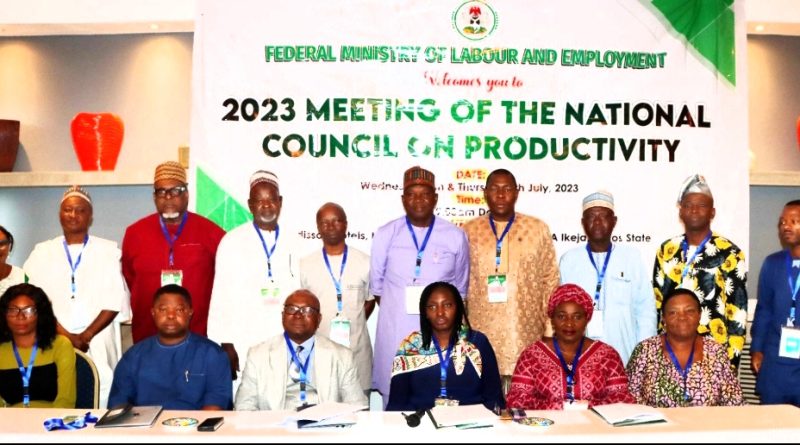FGN To Ensure Policies And Program Implementation In Response To Low Productivity
Oru Leonard
In a bid to improve national productivity as means of increasing total national wealth and responding to the lingering low level of productivity in most sectors of the economy, the Federal Government will continue to enforce implementation of established institutional and legal frameworks to anchor policies and programmes targeted at embedding productivity consciousness in society.
The Permanent Secretary, Federal Ministry of Labour and Employment, Kachollom Daju, mni, made this known at the 2023 Meeting of the National Council on Productivity, holding from 5th – 6th of July at Radisson Hotel, Ikeja, Lagos.
Daju stressed that Federal Government was prioritizing enhancement of national productivity as low productivity in most sectors of the nation had become a clog in the wheel to realising the objectives of the nation’s developmental goals and aspirations whilst lamenting that the manufacturing sector had taken a beating which was evident in foreign exchange earnings, limited number of jobs created and an import bill that can hardly be sustained by current earnings, further explaining that Nigeria’s GDP growth averaged 1.1 percent in the last seven years according to the National Bureau of Statistics report of 2021, causing unemployment and underemployment rates to increase while forcing at least 133 million Nigerians into poverty.
“According to the National Bureau of Statistics, Nigeria’s GDP growth averaged 1.1 percent in the last seven years, between 2015-2021, even as the country experienced two recessions. This caused unemployment and underemployment rates to increase to an all-time high of 56.1 percent in 2020, pushing at least 133 million Nigerians into multidimensional poverty” she said.
She stated that government’s efforts in tackling low productivity include the establishment of a legal framework to drive relevant policies and programmes.

Daju disclosed that the ministry, through its Productivity Measurement and Labour Standards (PMLS) Department, in collaboration with the National Productivity Centre, was at the forefront of the Federal Government’s intervention, by monitoring trends, conducting surveys, and continuous strategic implementation of initiatives aimed at improving Nigeria’s global productivity ranking.
“The National Council on Productivity is one of the structures provided for in the National Policy on Productivity along with the state council on Productivity and Local Government Committees to give full effect to the implementation of the policy.
“The inauguration of this Council in January, 2022 is evidence of government’s recognition of the role of productivity improvement and unflinching commitment towards mainstreaming productivity consciousness into the national plan”, she said.
The Permanent Secretary urged council members to come up with strategic and analytic discourse that will chart a way forward in improving the productivity landscape in Nigeria, bearing in mind the challenges posed by insecurity, information technological improvements, artificial intelligence, job outsourcing, amongst others, even as she applauded the council for having a full grasp of the issues contending with consolidating the gains of government’s aspiration going by the resolutions from its 2022 meeting.
She emphasised government’s commitment to galvanising both human and financial resources to ensure that the country’s productivity ranking and global competitiveness occupied an enviable position amongst the comity of nations.
Also speaking, Director, PMLS, Mrs Juliana Adebambo, reiterated the importance of productivity to any economy saying that it played a pivotal role in the sustenance of the global economy, and Nigeria was not an exception as it is the bedrock for economic growth and development.
According to her, the country’s productivity was dependent on how successfully the economy transforms land, labour capital and other inputs into goods and services.
Adebambo observed that the decision of the council to convene at this time was apt as a new government had recently taken over the helm of affairs and hoped that deliberations and recommendations of the council will assist the current administration to pave the way for a more productive society for the economic wellbeing of the citizens and national development.




